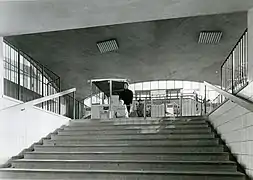Blackeberg metro station
Blackeberg metro station is a station on the Green line of the Stockholm metro. It is located in the district of Blackeberg, which is part of the borough of Bromma in the west of the city of Stockholm.[3] The station has a single island platform, with access from a station building spanning the tracks. Two thirds of the platform is located outdoors and one third is located in a rock tunnel under Blackebergsplan.[4][5] The distance to Slussen is 14.1 km (8.8 mi).[1]
Blackeberg | |||||||||||
|---|---|---|---|---|---|---|---|---|---|---|---|
| Stockholm metro station | |||||||||||
 Outdoor part of platform, 2006 | |||||||||||
| General information | |||||||||||
| Coordinates | 59°20′54″N 17°52′57″E | ||||||||||
| Owned by | Storstockholms Lokaltrafik | ||||||||||
| Distance | 14.1 km (8.8 mi) from Slussen[1] | ||||||||||
| Platforms | 1 island platform | ||||||||||
| Tracks | 2 | ||||||||||
| Construction | |||||||||||
| Structure type | At grade | ||||||||||
| Accessible | Yes | ||||||||||
| Other information | |||||||||||
| Station code | BLB | ||||||||||
| History | |||||||||||
| Opened | 26 October 1952 | ||||||||||
| Passengers | |||||||||||
| 2019 | 4,700 boarding per weekday[2] | ||||||||||
| Services | |||||||||||
| |||||||||||
| Location | |||||||||||
 | |||||||||||
The station was inaugurated on 26 October 1952 as a part of the section of line between Hötorget and Vällingby.[3]
The station building was designed by Peter Celsing, who was head of the architectural office of AB Stockholms Spårvägar, the city owned public transport company. The building stands on the northern side of Blackebergsplan and has entrances from the square and, at a lower level, Vinjegatan. The ticket hall floor is at the Vinjegaten level, and a monumental double staircase leads down from the Blackebergsplan entry. The hall has a square floor plan with 22 metres (72 ft) sides, and its roof is a flat, free-span dome of reinforced concrete, with an untreated surface. The building is blue-rated by the Stockholm City Museum, which means "that the buildings are judged to have extremely high cultural-historical values".[6][7][8]
The tunnel section of the station is decorated with green, blue and yellow tiles. As part of Art in the Stockholm metro project, the station received naturalistic paintings on glazed clinker by Ruben Heleander in 1987.[9]
Gallery
 Entrance to station from Blackebergsplan, 2011
Entrance to station from Blackebergsplan, 2011 Ticket hall seen from Blackebergsplan stairs, 2016
Ticket hall seen from Blackebergsplan stairs, 2016 Stairs and lift to platform, 2018
Stairs and lift to platform, 2018 Stairs from platform, date unknown
Stairs from platform, date unknown Underground part of platform, 2018
Underground part of platform, 2018
References
- Alfredsson, Björn; Berndt, Roland; Harlén, Hans (2000). Stockholm under: 50 år – 100 stationer (in Swedish). Stockholm: Bromberg. p. 60. ISBN 91-7608-832-4. SELIBR 7652820.
- "Fakta om SL och regionen 2019" (PDF) (in Swedish). Storstockholms Lokaltrafik. p. 51. Archived (PDF) from the original on 27 December 2020. Retrieved 29 March 2021.
- Schwandl, Robert. "Stockholm". urbanrail. Archived from the original on 23 April 2019. Retrieved 8 May 2019.
- "Blackeberg". Google Maps. Retrieved 8 March 2022.
- Alfredsson, Björn; Berndt, Roland; Harlén, Hans (2007). Stockholm under: 100 stationer (in Swedish) (2nd ed.). Stockholm: Bromberg. p. 64. ISBN 978-91-7337-051-6. SELIBR 10614768.
- "Peter Celsing". archINFORM. Retrieved 8 March 2022.
- "Blackeberg tunnelbanestation" [Blackeberg Metro Station]. The Building Register (in Swedish). Swedish National Heritage Board. Retrieved 15 February 2022.
- "Stadsmuseets interaktiva karta för kulturmärkning av byggnader i Stockholm" [The City Museum's interactive map for cultural marking of buildings in Stockholm] (in Swedish). Retrieved 16 March 2022.
- "Art in the Stockholm metro" (PDF). Stockholm Transport. Archived from the original (PDF) on 13 September 2008. Retrieved 10 September 2008.